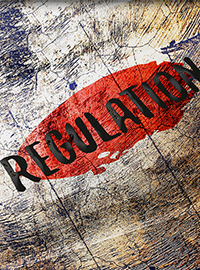| To Deregulate America, Dump DC Bureaucrats |
 |
|
By Betsy McCaughey
Wednesday, December 20 2017 |
Flanked by a towering 185,000 pages representing the federal regulatory code now and a short pile of 20,000 pages — the code's length a half-century ago — President Trump pledged last week to return us to the days of fewer regulations. Pointing to the colossal pile, which would take some three years to read, the president reiterated what Americans know firsthand, that "every unnecessary page" means "projects never get off the ground." Trump claims he's already eliminated 22 rules for every new one imposed this past year. His critics dispute how many he's actually scrapped, but no one denies he's brought the steady stream of new rules nearly to a halt. This regulatory pause is buoying business optimism and the stock market. What's coming next? Rolling back rules on mining, manufacturing, oil exploration, banking, you name it. Even better, both the Trump administration and some Democrats in Congress want to relocate federal agencies from inside the D.C. beltway to cities in the nation's heartland. Getting Washington out of Washington. Imagine regulators having to rub elbows with the people being regulated. There's a lot of wisdom outside the Washington bubble. Why should federal management be concentrated so far from the industries and people affected? Earlier this year, the House Oversight and Government Reform Committee voted to "Divest D.C." and identify agencies easiest to move. The idea has bipartisan support. Rep. Tim Ryan, D-Ohio, sees it as a way to repopulate economically depressed cities that offer cheaper office space and housing, less traffic and a lower cost of living for federal workers. Think Cleveland, Buffalo, Syracuse, Detroit. These struggling cities have universities, airports — amenities of urban living without the astronomical cost of Washington, D.C. Bringing federal agencies to these cities could revitalize failing economies as office supply stores, restaurants and home builders spring up to meet the demands of federal workers and their families. Taking the lead is Interior Secretary Ryan Zinke, currently developing plans to move three large public land-use agencies to the West. Western governors like Colorado's John Hickenlooper are wooing Zinke to get operations moved there. New York's Andrew Cuomo should take a page from that playbook, and promote our upstate cities as suitable homes for federal agencies. Of course, not all federal workers residing in D.C. will move willingly, and opponents of the idea claim it's a covert way to shrink the federal workforce. All the better, says Philip Howard, chairman of Common Good. "Agencies should be moved out of D.C. and repopulated with people looking to help Americans, not stifle them." And not deliberately thwart the policies of the president. One of Trump's biggest challenges is taming the "deep state" — now two million federal bureaucrats strong — burrowed deep in agencies across the capitol region. Dispersing it is one way. The Washington bureaucracy appears determined to undermine the president's agenda. Bureaucrats at State resist Trump's historic recognition of Jerusalem as Israel's capital, and Energy Department workers push for solar and wind power and zero-emission vehicles, never mind Trump's commitment to fossil fuel exploration. Thank this permanent bureaucracy for the 185,000 pages of stifling regulations. Through Republican and Democratic administrations, regulations on manufacturing have come gushing out of Washington, D.C. Regardless of the merits of each specific regulation, impose enough of them, says Stephen Gold, CEO of an industry group, and manufacturing "starts to sputter." The torrent has stopped since Trump took office. In his first six months, the feds issued 405 final rules — less than one-third the number issued by the Obama administration and less than one-quarter the number under George W. Bush in their first six months. That's just for manufacturing. Overall, said President Trump last Thursday, "the never-ending growth of red tape in America has come to a sudden, screeching and beautiful halt." Betsy McCaughey is a senior fellow at the London Center for Policy Research and a former lieutenant governor of New York State. |
Related Articles : |
























